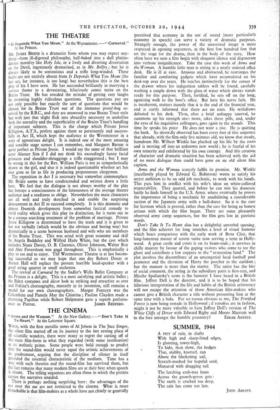THE THEATRE
It Depends What You Mean." At the Wistminster.—" Carnaval." At the Princes.
MR. JAMES Bemre is a dramatist from whom you may expect any- thing---from ill-digested philosophy, half-baked into a dull platitu- dinous morality like Holy Isle, or a lively and diverting dissertation on the Devil, ingeniously dramatised, as in Mr. Bolfry ; but he is always likely to be sententious and a trifle long-winded. These faults are not entirely absent from It Depends What You Mean (the last act, for instance, is too long) but nevertheless this is the best play of his I have seen. He has succeeded brilliantly in marrying a serious theme to a devastating, hilariously comic 'satire on the Brains Trust. He has avoided the mistake of getting easy laughs by inventing highly ridiculous questions. The questions put are not only possible but exactly the sort of questions that would be chosen for its Brains Trust out of the immense postal-bag re- ceived by the B.B.C., and they are answered in true Brains Trust style but with just that slight flick into absurdity necessary to underline both the unreality and the superficiality of the Brains Trust's handling of important subjects. This is the charge which Private Jessie Killigrew, A.T.S., prefers against them so persistently and success- fully in Act II, which kept the audience at the Westminster in a state of uproarious delight. It is indeed one of the most amusing and sensible stage scenes I can remember, and Margaret Barton is quite perfect as Private Jessie. I would say the same of that brilliant actor Alastair Sim if I did not think his exceedingly funny facial grimaces and shoulder-shruggings a trifle exaggerated ; but I may be wrong in this for the Rev. William Paris is not as sympathetically drawn as the girl, and also it is indeed questionable whether art has ever gone so far as life in producing preposterous clergymen.
The exposition in Act I is necessary but somewhat commonplace. Mr. Bridie seems to have condescended and written down a little here. We feel that the dialogue is not always worthy of the play but betrays a consciousness of the fatuousness of the average theatre audience and a readiness to oblige. Nevertheless the main characters are all well and truly sketched in and enable the surprising denouement in Act II to succeed completely. It is this dramatic and almost Ibsenish development from somewhat farcical comedy to vivid reality which gives this play its distinction, for it turns out to be a serious searching treatment of the problem of marriage. Private Jessie Killigrew is determined to have the truth and it is given to her not verbally (which would be the obvious and boring way) but dramatically in a scene between husband and wife who are members of the Brains Trust. This was acted with great economy and skill by Angela Baddeley and Wilfrid Hyde White, but the cast which includes Nuna Davey, 0. B. Clarence, Olives Johnston, Walter Roy and Alec Faversham was goiad throughout. This is emphatically a play to see and to enjoy. THE Westminster Theatre is at last becom- ing successful so we may hope that one day Robert Donat or Anmer Hall will replace the present horrible loud-speaker with a good string quartet or small orchestra.
The revival of Carnaval by the Sadler's Wells Ballet Company at the Princes is a delight. This is a most satisfying and artistic ballet ; the Bakst costumes and &icor look 'as striking and attractive as ever and Fokine's choreography, masterly in its invention, still remains a model for our own choreographers. Margot Fonteyn was the Columbine and Pamela May the Chiarina ; Pauline Clayden made a charming Papillon while Robert Helpmann gave a superb perform-


























 Previous page
Previous page